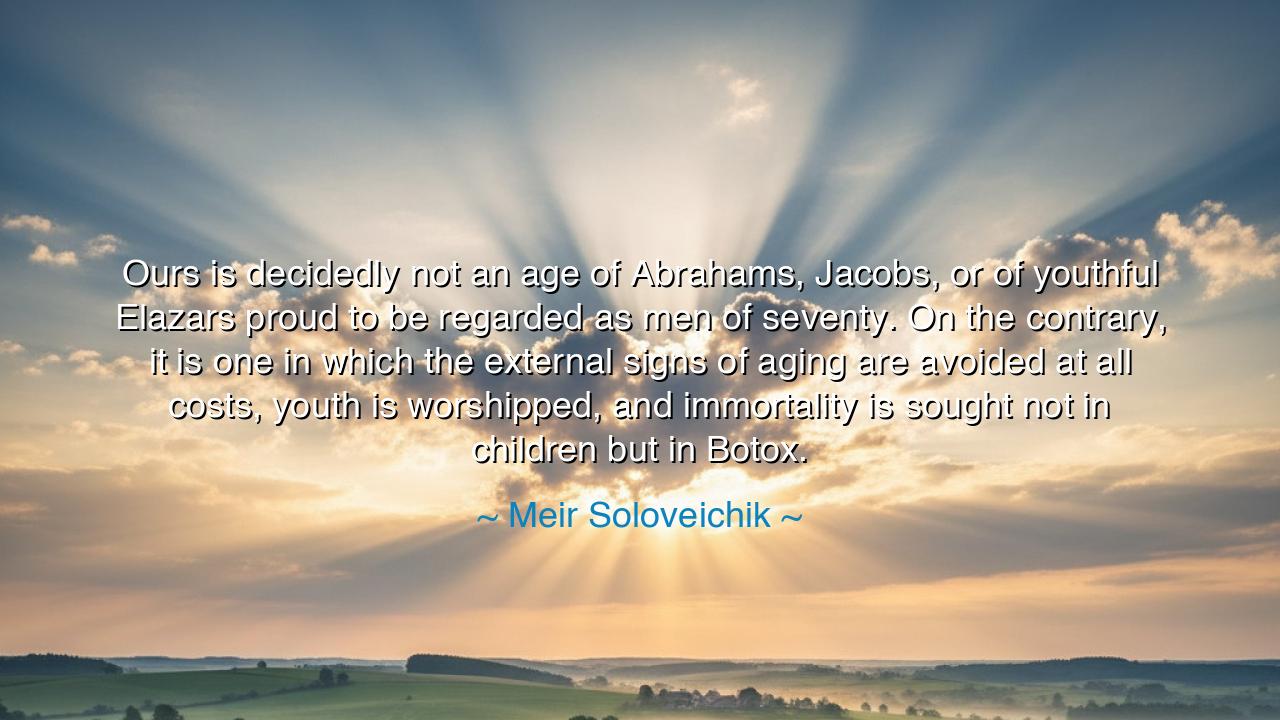
Ours is decidedly not an age of Abrahams, Jacobs, or of youthful
Ours is decidedly not an age of Abrahams, Jacobs, or of youthful Elazars proud to be regarded as men of seventy. On the contrary, it is one in which the external signs of aging are avoided at all costs, youth is worshipped, and immortality is sought not in children but in Botox.






In the timeless arc of human history, aging was once viewed as a mark of wisdom, a testament to a life well-lived. Figures like Abraham, Jacob, and Elazar in the ancient texts were revered not for the beauty of their youth, but for the strength they demonstrated in their years. These were men who carried the weight of their years with dignity, who embraced the natural signs of aging as symbols of honor and experience. But as Meir Soloveichik powerfully observes, "Ours is decidedly not an age of Abrahams, Jacobs, or of youthful Elazars proud to be regarded as men of seventy. On the contrary, it is one in which the external signs of aging are avoided at all costs, youth is worshipped, and immortality is sought not in children but in Botox." His words carry an urgent call to reflect upon how society today views age—not as a natural progression, but as something to be hidden, erased, and feared.
The ancients knew that the elderly were repositories of wisdom, the keepers of the stories, the legends, and the lessons of their time. Consider the revered King Solomon, whose wisdom was born not only from his vast knowledge but from the years he spent observing the world, understanding its flaws and beauties. His age was a reflection of his experience, and his leadership was grounded in the understanding that time gives clarity. Yet today, in an age of Botox and cosmetic surgery, the wisdom of years is often overlooked, as society rushes to preserve youth in ways that may lead to an erosion of the depth and substance that come with natural aging.
The value of youth has always held a special place in human history, but today it has become the epitome of all that is sought after. We see this in the rise of youthful images, perpetuated by both culture and commerce, where every wrinkle or sign of aging is viewed as an imperfection to be erased. The modern obsession with youth is not just about appearance but a refusal to accept the natural flow of life. It is as if the battle against time is fought not through wisdom, but by controlling the body’s image. This view directly contrasts with the ancient perspective, where age was not seen as something to fear, but something to embrace and celebrate.
In Homer’s Odyssey, we see the story of Odysseus, a hero whose adventures spanned many years. He grew older, but his wisdom, gained from countless experiences, became the cornerstone of his strength. His journey was not just through the physical world, but through the very essence of time. Yet, even as Odysseus matured and his body grew weary, his mind remained sharp. His age was not something he dreaded, but something he used to his advantage. In contrast, the modern world often seems to equate aging with weakness or decline, failing to recognize the deeper power that comes with years of living, learning, and growing.
Meir Soloveichik’s reflection on the worship of youth and the obsession with immortality through artificial means challenges us to reconsider how we define value in the human experience. Instead of seeking to preserve a fleeting appearance, perhaps we should focus on preserving the qualities that truly matter—our wisdom, our integrity, and the love we cultivate throughout our lives. It is a call to let go of the superficial pursuit of youthful perfection and instead to seek the deeper, lasting immortality that comes from passing down our knowledge and values to the generations that follow.
In the life of Socrates, we see an example of how age and experience can be used not to hide, but to enrich the human spirit. Despite his physical aging, Socrates’ mind remained sharp, and his dialogues with his disciples—conversations that shaped much of Western philosophy—were marked by his understanding that true immortality lies not in our appearance, but in our actions and ideas. He did not seek to reverse the signs of his age, but used his aging years to share the depth of his understanding of the human condition. Through him, we learn that wisdom is the truest form of immortality.
Thus, the lesson from Soloveichik’s words is not just one about accepting age, but about redefining what we seek in life. The obsession with youth and the superficial ways we attempt to halt the march of time miss the deeper truth of existence—that the true beauty of life lies in the experience we gather, the knowledge we impart, and the legacy we leave behind. Age is not a burden, but a gift—a gift that brings clarity, strength, and purpose. Let us embrace the passage of time not with fear, but with the wisdom that each year adds to the richness of our souls, knowing that the true path to immortality lies not in defying age, but in living a life worthy of remembrance.






AAdministratorAdministrator
Welcome, honored guests. Please leave a comment, we will respond soon